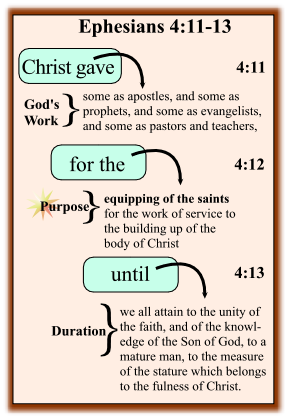 |
|
|
Intro (Ephesians 3:1-10) | Gospel's Value (Ephesians 3:1) | Reliability (Ephesians 3:2-5) | Glory (Ephesians 3:6-7) | Calling (Ephesians 3:8-10) | Questions (Ephesians 3:1-10)
|
D) The Calling of the Gospel (Ephesians 3:8-10)
3:8 To me, the very least of all saints, this grace was given, to preach to the Gentiles the unfathomable riches of Christ, 3:9 and to bring to light what is the administration of the mystery which for ages has been hidden in God, who created all things; 3:10 in order that the manifold wisdom of God might now be made known through the church to the rulers and the authorities in the heavenly places (Ephesians 3:8-10).
There is no higher calling than the privilege of living and proclaiming the Gospel of Christ.
The apostle gets very personal – “to me.” He does not hang out his degrees nor boast of his accomplishments. Earlier on he had spoken of his imprisonment (the prisoner of Christ Jesus (3:1)), but here he only describes himself “the very least of all saints.” In a sense he competes against others for this position. He probably wins the award because of his persecution against Christians, depth of knowledge of God’s law and pride in his zeal and race. Others have similar stories. Most of the evangelists and pastors in developing areas of the gospel were once very antagonistic to the gospel and the Lord’s workers before God saved them. But Paul’s Jewishness and familiarity with the word of God pushed him into the winning category for “the very least of all saints.”
Of course, he wins nothing from this but only the opportunity to more dramatically show forth the glory of the gospel. The weaker we are, the more we see His strength. The more evident evil allows a greater grace to be seen. By seeing God’s forgiveness touching such a person we can understand more of God’s marvelous grace. In any case, our own lives if rightly looked at provide a great opportunity for us to make known His majestic grace. We see this in verse 10 when Paul speaks of the way the “manifold wisdom of God might now be made known through the church.”
Calling as Saints
 Our calling as saints is often too narrowly perceived as what we are saved from. We should see what we are saved for. It is this that makes Christian living dynamic. If we only focus on what He has done, we get too focused on our lives and His choice for us. Our persistence in obtaining what God wants to accomplish through our lives keeps us humble, dependent, seeking His grace and discovering more of His miraculous grace abounding in our lives.
Our calling as saints is often too narrowly perceived as what we are saved from. We should see what we are saved for. It is this that makes Christian living dynamic. If we only focus on what He has done, we get too focused on our lives and His choice for us. Our persistence in obtaining what God wants to accomplish through our lives keeps us humble, dependent, seeking His grace and discovering more of His miraculous grace abounding in our lives.
Remember Paul was only one life. A significant life to be sure because his life reflected the way God worked in Christ’s life. But what he did also shows how God wants to work in each of our lives. Our calling will not be to receive the hidden gospel because it is already revealed. Paul knew this was part of his mission, “To bring to light what is the administration of the mystery which for ages has been hidden in God, who created all things.”
God in His unique design brought forth the revelation of His fuller plan which was predicted, encrypted in the Old Testament and finally brought about in time. We will only fully understand this all when Christ returns, and we can get a better perspective. God’s purpose for creating all things is found in this revelation of revealing the extraordinary grace and wisdom of God in Christ.
Nor might we be an apostle, though it is possible, especially if you are to go to places where the gospel is not yet known. (Read more on these gifts of apostle, prophet, pastor, teacher and evangelists by clicking on chart on right). Some have this calling, “To preach to the Gentiles the unfathomable riches of Christ.”
The greatness of this age is not all the modern technology, though that has its own fascination - we are better using the world God made. (Are you not glad God does not put a tax on the use of electronic signals through His air!) Far more special is to see that the Lord is reaching the ends of the earth.
To this end also we pray for you always that our God may count you worthy of your calling, and fulfill every desire for goodness and the work of faith with power (2 Thessalonians 1:11).
This word for Gentiles is the Greek word ‘ethne’ from which we get ethnic groups. Paul started the preaching to these thousands of ethnic groups but there are so many more. Language is the chief barrier to bringing the gospel to the ends of the world. I personally fit into this work by strengthening God’s workers pastors, apostles (church planters) and evangelists in His Word. They in turn have the language to go to these tucked away villages who know not Christ. When I am at home, I pray. When I am abroad I both preach and pray.
There is no greater message than to tell others that they can take part in the riches of Christ. I know many of you are not convinced. Deep down you think the riches of the world are more meaningful. This is why you use your spare time playing stocks and making deals. Of course, we all need to make a living. But unless deep down we understand the riches that are in Christ, we will chase after the world. So let me ask you, what riches is he speaking of?
He is speaking of what we have just noted in 3:6. To think that rebellious sinners are invited to be part of God’s family, share in Christ’s riches as a son, feel part of God’s work as a coworker or be mutually loved and needed by others is a dream come true. Some of you might look down on cell groups or the church. This is wrong. The world can’t get near what is true in the church. Simply amazing! Of course, we sometimes do not live out what God has given to us. We oftentimes do not even fathom what God has blessed us with. We are often like the starving widow who does not realize she has $100,000 in a Library deposit.
We all are, however, a part of that holy temple on earth filled with the presence of God to make manifest the great power and love of God. Please note our calling in 3:10. Let me repeat the whole verse to provide its context, “In order that the manifold wisdom of God might now be made known through the church to the rulers and the authorities in the heavenly places (Ephesians 3:10).

Paul as an apostle was part of the process in which the church of God is established. This is not the most spectacular part. Even more wonderful is to see the final purpose of what God is doing through the church. When we first hear that word ‘church,’ we probably think of structured religion. The actual word was used both in the Old and New Testament to describe those called out from the work into God’s presence. Church literally means “called out ones" very similar to the word saints (see more on the word 'saint'). The church, however, is noted for its broad inclusive collection of God’s people over time and space.
We are called as a whole to represent God’s glorious nature. He reveals His true nature to rulers and authorities in the heavenly places through the church. You might wonder, “What is so special about the church?” We must assume these rulers and authorities would at least include the angels such as the cherubim. Perhaps it also includes godly people through time that are saved by Christ’s blood. They more than likely would not include demons and Satan or those who mock His Word. They are not in the heavenly places. In any case, we should see ourselves, if indeed we are part of Christ, as God’s showpieces from which one can look at and see glimpses of our Lord’s glorious grace. (Read more on this special purpose of equipping the saints to rightly carry out their ministry).
Perhaps we should note here that the scriptures emphasize grace more than love. Grace better pictures God’s magnanimous nature. Love emphasizes the depth of commitment but leaves out how unworthy the recipients are to receive that love. John used the word love more. Perhaps it came to be more popular of a word later on.
Summary
We need to remember that we have a calling from God that commands us not only look back at what God has done in Christ but also to look forward to what is our responsibility to live and make known God’s glorious person.
Application
Let me give you a few examples.
- If you are selling a car, perhaps you are tempted to refrain from telling about that one certain problem. You are desperately trying to sell it. But you know that you would not want another to sell you a car like that so you give him the full picture of the car. God is glorified.
- A couple wants to adopt a child. They purposely look for a child from another country who has a big health problem. They adopt her even though it seems like she will not live more than ten years. God’s love is seen.
- A husband is very upset with his wife for the way she insulted him. He does not treat her as she deserves but forgives her in his heart and buys her a special gift again thanking the Lord for the wife he has. God’s grace is magnified here and every time that we live out God’s grace. (More on the need and call for a husband to love his wife from Ephesians 5:25).
Summary of Ephesians 3:1-10
Paul simply stated that it is because the glorious gospel that Paul was willing to suffer as a prisoner and live his life rejected by his own people. We can see that he had no ulterior motive but to please Christ. This is the same Gospel that makes each one of His children a debtor to His grace. The Gospel is of such value that we ought to be willing to suffer whatever is needed to carry His grace to the ends of the earth. The Gospel is so thoroughly transforming and reliable that we are able to give our every bit of commitment to its proclamation. The Gospel is of such awesome power that we purposely and deliberately proclaim His Word. The Gospel’s calling is of such great purpose that I must live out Christ’s life everywhere I go causing more of God’s characteristics seen on earth.

We are not Paul. But Paul has shown how a wicked extremist can change and bring glory to God’s Name. We likewise are beneficiaries of God’s love and grace and must in our own positions of life display the glory of god. This does, after all, declare God’s glory in the heavenlies where others look on and gaze at God’s amazing grace.
Therefore, since we have so great a cloud of witnesses surrounding us, let us also lay aside every encumbrance, and the sin which so easily entangles us, and let us run with endurance the race that is set before us, fixing our eyes on Jesus, the author and perfecter of faith, who for the joy set before Him endured the cross, despising the shame, and has sat down at the right hand of the throne of God” (Hebrews 12:1-2).
A prayer
May we all more clearly grasp the awesome glory to be one upon whom the Gospel is bestowed that we are dedicated to consistently living out the Gospel and making the grace of God known here on earth as well as in the heavenlies. And Lord, wherever we have a less than appropriate confidence in your marvelous work, convince us of your sincerity to bring about love across the hearts of many in this world.
Bible Study Questions forms the last study on Ephesians 3:1-10. Or check out other material on Ephesians below or on the whole Bible!
 Most of BFF articles such as this one is nicely formatted for printing. This article also has a Powerpoint. Check out the great number of articles on the BFF Biblical Training Library all at one low cost. |
Read more exciting and practical articles on the Book of Ephesians.
Introduction to the Book of EphesiansPaul's Second Missonary Journey to Ephesus - Map Ephesians 1Ephesians 1:1-3 Every Spiritual BlessingEphesians 1:1-3 Every Spiritual Blessing Ephesians 2Ephesians 2:1-3 Our Need, His GraceEphesians 2:1-3, an Introduction Ephesians 3Ephesians 3:1-10 Growing in Our Commitment |
Ephesians 4Ephesians 4:1-3 Preserving the Spirit's UnityIntro: Problems of Disunity Ephesians 4:11-16 The Purpose of TrainingEphesians 4:11-13: A) God's Word in the Church Ephesians 4:14 B) Responsibility 1. Deceit Ephesians 4:11-14 Chart: Equipping of the Saints Ephesians 5-6Ephesians 5:22,24 Wives be Subject to your Husband |
BFF Homepage | Top | Back | BFF Topics | BFF Bible articles | Ephesians 3:1-10 Study questions | Next =>
Biblical Foundations for Freedom
Paul J. Bucknell
NASB Bible used